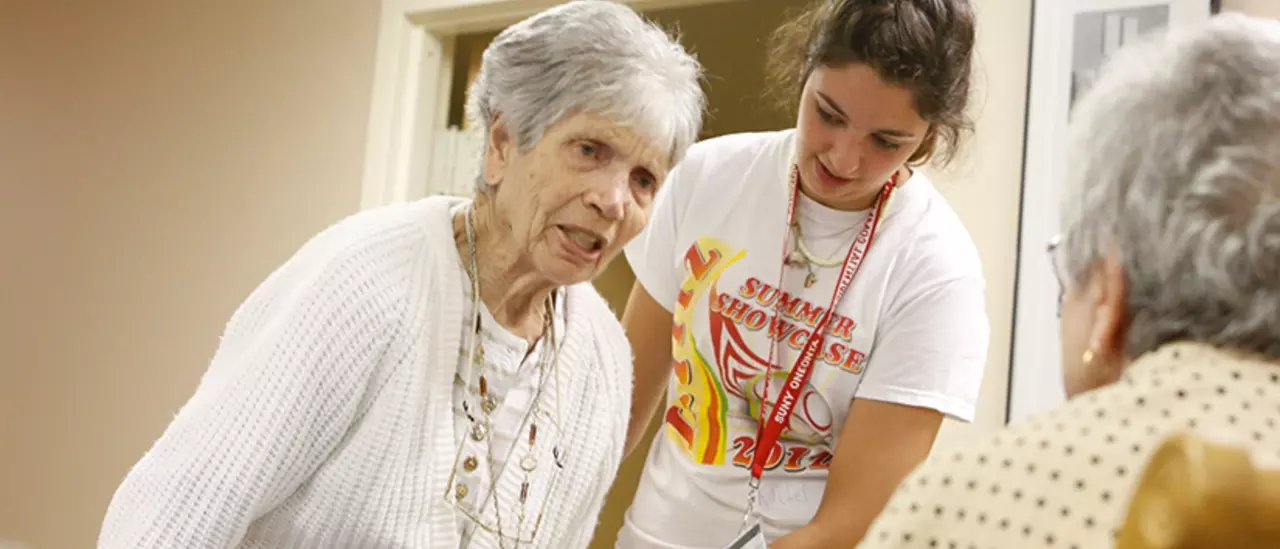SUNY Oneonta's Pre-Health Professions Office provides specialized guidance and support for students preparing to apply to occupational therapy school to be an occupational therapist.
Preferred Acceptance
Highly qualified SUNY Oneonta students have the opportunity to apply for Preferred Acceptance at Russell Sage College. Additional information, including qualifying criteria, can be found on our Health Professional School Articulation Webpage.
The field of Occupational Therapy allows for 2 points of entry for educational pathways leading to licensure: a Master’s level degree (MOT) or a Doctorate level degree (DOT). Students should consider carefully which educational path is best for them and reach out to individual schools to understand the requirements each require.
What is Occupational Therapy?
"Occupational therapy is a science-driven, evidence-based profession that helps people of all ages to recover from injury, disability or illness and participate in activities of daily living. For example, they might help young children with disabilities participate fully in school or support older adults coping with physical or cognitive decline. Practitioners practice from a holistic perspective, and actively integrate the client and their family in the therapy treatment plan. They emphasize adapting the environment to the specific needs of the client."
- ExploreHealthCareers.org
Learn More
For additional information regarding occupational therapy programs, visit AOTA.org.
Prerequisite Courses & Electives
Students must consult SUNY Oneonta's current undergraduate catalog for course descriptions, prerequisites, and time of year when courses are offered to plan properly in advance.
Prerequisites for Occupational Therapy School:
- BIOL 1001: Investigative Biology Laboratory
- BIOL 1002: Cellular Perspectives in Biology
- BIOL 1004: Organismal Perspectives in Biology
- BIOL 1008: Biological & Medical Terminology
- BIOL 3202: Human Anatomy & Physiology I
- BIOL 3204: Human Anatomy & Physiology II
- CHEM 1111: General Chemistry I
- PHYS 1030: General Physics I: Non-Calculus
- PSYC 1000: Introductory Psychology
- PSYC 2450: Lifespan Development (Developmental PSYC course preferred at most OT schools)
- PSYC 3720: Introduction to Abnormal Psychology
- SOC 1001: Introduction to Sociology or ANTH 1000: Introduction to Cultural Anthropology
- STAT 1010: Introduction to Statistics
Though a strong application includes a prerequisite and overall GPA greater than 3.3, programs are seeking applicants that are well-rounded in educational and life experience and can articulate an understanding of the career and vision for themselves in the Profession.
Occupational Therapy education programs may change course prerequisites at any time and may have additional requirements, preferences, or policies that are not reflected in this prerequisite course list and vary depending on weather a student is applying for a Masters or Doctorate Degree. Programs may also allow applicants to substitute courses or choose different prerequisite courses. Applicants should review the program-specific details and contact programs directly to determine whether a particular course will fulfill a prerequisite. Students have the responsibility to check entrance requirements for schools to which they intend to apply.
Occupational Therapy School Requirements
Students should regularly review the Occupational Therapy School Admission Requirements.
Applicants are evaluated on:
- letters of evaluation (including an Occupational Therapist and a Professor in your Major).
- leadership skills (on and off campus)
- GPA (specific calculation based on the OTCAS standardization)
- GRE (not all schools require the GRE)
- Occupational Therapy Observation hours (paid and/or volunteer)
GRE Preparation
Many Occupational Therapy Programs require the GRE General Test.
- GRE preparation options include free and paid test prep programs
- ETS offers free and paid test prep options
- SUNY Oneonta offers discounted GRE Test Prep.
Application Timeline
Application to occupational therapy programs is typically made through the centralized application OTCAS.
- The OTCAS Application Cycle opens annually in mid-July.
- NOTE: Not all Occupational Therapy programs participate in OTCAS.
- Be sure to confirm the application process for each school to which you plan to apply.
Letters of Evaluation
Students request three letters of evaluation to be submitted on their behalf for occupational therapy school applications. Appropriate evaluators include science faculty, other course instructors, healthcare professionals, current or former employers, and professional references.
